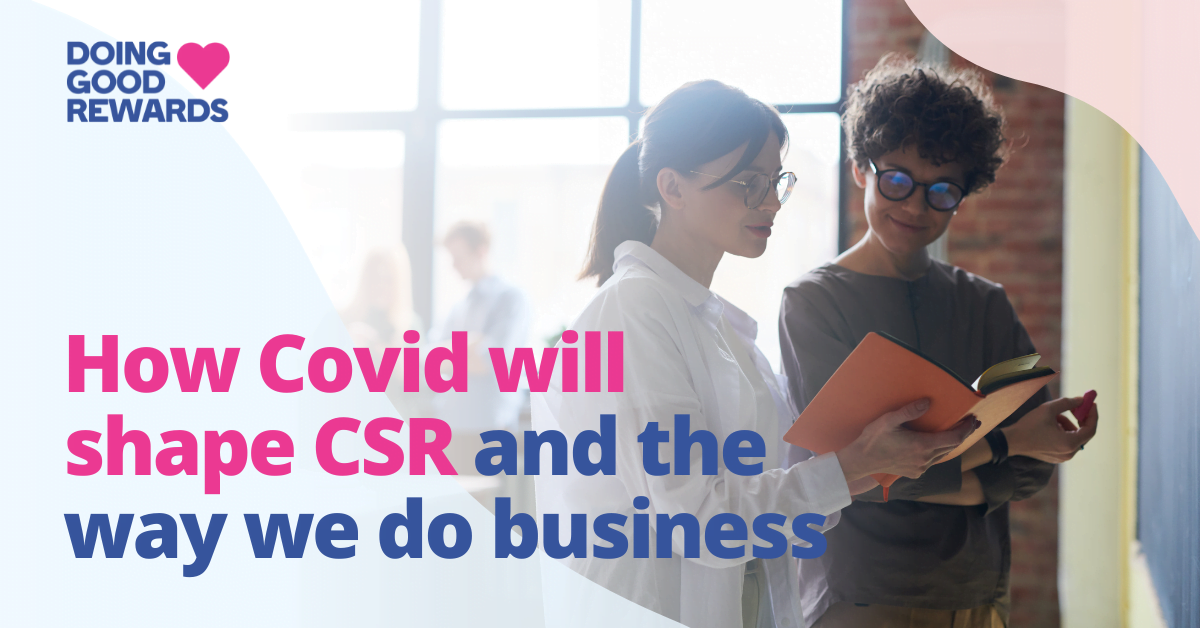
How Covid will shape CSR and the way we do business in the “new normal”
There’s a particular “C” word that has shaken us in many ways since 2020.
And of course, it’s Covid but more importantly, it’s Change – the repercussion of Covid.
Working from home, endless online meetings, home-schooling, being unable to travel, wearing face masks and sanitising our hands until they’re dry – these are the changes we’ve somewhat adapted to in the last two years.
But change has also been happening in the industry and affecting how businesses operate especially in areas like corporate social responsibility (CSR). Clinical psychologist, TP Wong once said: “A true person’s character is often shown in times of crisis” – a statement that can also apply to companies and their commitment to improving during the pandemic.
There’s been more scrutiny on businesses and if they are really true to their values to help their communities in troubling times.
With lockdowns and isolation causing 1 in 5 Australians to report high levels of psychological distress (Australian Bureau of Statistics), many businesses feel compelled to put more focus on the wellbeing of individuals on top of the usual bigger-scale charity support system.
Businesses have realised that their way of responding to the pandemic has been critical for survival and some have turned it into an opportunity to give back to their communities. With an emphasis on enriching relationships and supporting people starting at the workplace first, charity sure begins at home. Here’s how CSR may evolve and change with this endemic and influence the way businesses will operate in the new normal.
Helping vulnerable people
The pandemic didn’t just affect some people, it has swept through the lives of every single person. But vulnerable people who are already in disadvantaged situations have felt it the most.
Vulnerable individuals are classified as those above 65, have compromised immune systems or an existing health condition, a victim of domestic violence, are physically impaired, homeless, an Aboriginal or Torres Strait Islander over 50 who has comorbidities, or other adverse circumstances.
Unfortunately with many companies operating on the principle of “profit before people”, the vulnerable are often the last to be listened to but the first to be required to work in conditions that must meet high demands that put their health more at stake. Any crisis exacerbates their situation as it will impact even their basic human needs like food, security and shelter.
Many vulnerable individuals feel unsafe because they are overlooked by key decision-makers. But the health implications of coronavirus brought heavy focus on vulnerability prompting more businesses to make human-centric decision-making processes so they can understand and prevent further distress.

Many vulnerable individuals feel unsafe because they are overlooked by key decision-makers.
Several state government bodies have released guides on how businesses can support their vulnerable workers by first understanding their situation such as listening to their concerns. This is followed by making work arrangements that will ensure their safety and wellbeing.
This process builds trust not only with the workers but all stakeholders as everyone witnesses a strong human values based approach to determine future business decisions.
Here are more details on how you can help your vulnerable staff.
Creating meaningful connections with customers
As human beings, we crave deeper and more meaningful connections with others. Plenty of research has found that humans thrive and live longer when they have strong emotional relationships.
But isolation has deprived us of that and bonding through a screen wasn’t going to be sustainable in the long run.
As a business, the shift from working onsite to at home meant significant overhauls to regular operations. Physical interaction was reduced and companies wanted to create more trust to connect emotionally with their staff and customers.
Showing kindness, support and concern goes far beyond forecasting sales for the next quarter. It reveals the human side of a business by having more purposeful relationships with people.

Showing kindness and support reveals the human side of a business by having
more purposeful relationships with people.
Regular check-ins through phone or virtual calls, messaging and the old-fashioned letter sending are simple ways companies can show they care. Bosses and co-workers may feel closer to each other amidst the physical distance.
It’s an ongoing effort for businesses to retain their employees’ trust and customer loyalty. Once life resumes to normality, people will remember these businesses that showed empathy and kindness.
A little goes a long way and building meaningful human connections with stakeholders will ensure a business stands out by having a positive impact on society.
Businesses support businesses
In pre-covid times, it was always the survival of the fittest and beating your competition. But the crisis inadvertently shifted perspectives from foe to friendship giving rise to creativity, collaboration and community.
More and more businesses started supporting each other as they saw the power in numbers to build community spirit when it was at its lowest.
The Australian Bureau of Statistics Business Impacts of COVID-19 survey found that more than a third of businesses were struggling financially from September 2020 onwards so it was evident that small businesses needed all the help they could get.
At the peak of the pandemic and lockdowns in Australia, UberEats implemented relief measures to help small businesses maintain their cash flow. Restaurant partners could opt to receive daily payments instead of weekly and service fees on pick up orders were waived until June 2020.
Woolworths stepped in to help overcome the toilet paper shortage through its partnership with the charity, Meals on Wheels. They hand-delivered meals and toilet paper to the elderly and vulnerable.
Even small food outlets and retailers who’ve been hit hard by the lack of foot traffic stepped up to help their communities even if it initially didn’t seem to recover their losses.
Melbourne’s Basil Leaf Pho restaurant started selling face masks as a way to give back to the community. Restaurant owner Ann Do said that they wanted to educate people to use masks for protection and started supplying them to other shops in their neighbourhood of Fitzroy.
Nearby in South Melbourne, St Ali Cafe managed to save their business by pivoting their business to offer more support to their community. They began manufacturing sanitisers, face masks and introducing online grocery shopping.
The cafe’s founder, Salvatore Malatesta said their sales multiplied 10 fold and they managed to take care of their workers, workers, customers and community.
The last thing you need is more business uncertainty and losing your customers to the competition. In just two minutes, we’ll help you create a simple but effective loyalty and rewards program to keep your customers coming back for more while doing good for the world. Click here for more info.
Recent Posts
- 4 Tips For Communicating Your Social Impact
- Changemaker Consumers: 2023 Trends All Brands Need to Know
- Put your holiday spending to great use this holiday season!
- Stop just giving money to charity and go ‘full CSR’ with purpose
- The right way to promote and profit from your Corporate Social Responsibility credentials
Categories
Click here to email us & we’ll contact you to send more info
Click here to book a 15 min Zoom meeting to find out more
What would you like to do?

Stay ahead of the trends and the competition
Download Free PDF

